On 23 March, the General Administration of Quality Supervision, Inspection and
Quarantine (AQSIQ) released the list of substandard food and cosmetics imported
in January.
In total, there were 50 batches of dairy products found to be
substandard, of which 24 batches of Arla full cream milk and organic full cream
milk (produced by Arla Foods Deutschland GmbH, mainly in Germany and Denmark)
were destroyed, mainly for unqualified packaging and inconsistencies between
goods and certificates.
Key factor for substandard dairy products: excess content of E.coli
“Such long transport distances easily expose shortcomings of imported dairy
products, especially involving storage, shelf life and freshness.”
Accordingly, the excess content of E.coli is a key reason for imported dairy
products to be declared as substandard, including the following products:
-
Australia: Norco fresh milk and New South
Wales (both full cream milk, produced by Norco Co-operative Limited) and Procal
fresh milk (produced by Procal Dairies Pty Ltd.)
-
South Korea: Every Day Enjoy Lowfat Milk
(produced by Vilac Co., Ltd.)
-
The US: Mozzarella Cheese (produced by
Belgioioso Cheese Inc.)

In addition, excess content of mould also played a role:
-
Australia: strawberry-flavoured yoghurt
(brand and producer not declared)
-
Italy: La Sicilia cheese (produced by Colla
Spa)
Substandard use of food additives was an issue for:
-
South Korea: Every Day Enjoy High Calcium
Milk/ Lowfat Milk / Children's Milk (produced by Vilac Co., Ltd.)
-
Belgium: salty whipping cream (by S.A.
Corman)
Meanwhile, there were also problems such as excess pH and inconsistencies
between goods and certificates.
According to trade sources, it is very common for dairy products to be found to
contain excess E.coli. In addition to deficient sterilisation, inadequate
storage conditions in long-distance transportation also plays a role.
Imported milk: long-distance transportation and stringent storage requirements
Imported milk has stringent requirements in terms of transportation and
storage. Since 1 January, the Chinese government has carried out a “source
clearance” programme targeted at imported food. If the products are found to
have problems in terms of quality, labelling and / or packaging, they are not
allowed to enter the Chinese market.
Imported milk for sale in China is basically UHT milk, which in terms of
freshness is seen as inferior to domestically-made milk. This is mainly because
it takes several months for the imported milk to go through a series of
procedures such as customs declaration, transportation and inspection.
This is
also why imported milk commonly has fairly long shelf life – by the time these
products finally reach retail shelves, they may be close to the expiry date
running out. This impacts on sales and can damage brand reputation, in
particular in a market where product safety and freshness is so highly valued.
A government source stated: “Milk functions because of its amino acids and
active proteins. However, these are diminishing as the shelf life is ending.
UHT milk, after 4 months, may change in physical properties, and will not taste
as good as before. When 1 year passes, its nutritional value will be largely
eroded.”
This article comes from Dairy Products China News 1604, CCM

About CCM:
CCM is the leading market intelligence provider for China’s
agriculture, chemicals, food & ingredients and life science markets. Founded in 2001, CCM offers a
range of data and content solutions, from price and trade data to industry
newsletters and customized market research reports. Our clients include Monsanto,
DuPont, Shell, Bayer, and Syngenta. CCM is a brand of Kcomber Inc.
For more
information about CCM, please visit www.cnchemicals.com or get in touch with us directly by emailing econtact@cnchemicals.com or calling +86-20-37616606.
Tag: dairy milk